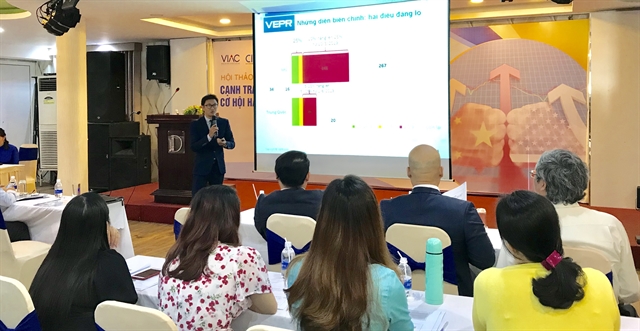Local exporters have been urged to prepare for any trade-related lawsuits and disputes arising from the escalating US-China trade war amid concerns that the two major powers will not reach an agreement this month.

Vietnamese exporters have been urged to prepare for any trade-related lawsuits and disputes arising from the escalating US-China trade war amid concerns that the two major powers will not reach an agreement at a meeting in Japan this month.
According to Tran Du Lich, vice chairman of the Viet Nam International Arbitration Centre (VIAC), the trade war is expected to continue to cause disruption to the global supply chain and lead to a hike in prices and decline in FDI worldwide.
He spoke at a conference on the trade war held in HCM City on Tuesday.
Pham Sy Thanh, director of the Viet Nam Centre for Economics and Policy Research’s China Economic Research Programme, noted that the US and China are not expected to reach a deal at the G-20 summit in Japan at the end of this month.
“The trade war is expected to continue to be more stressful in the next year,” he said. “The war has caused a decline in global economic growth while mounting protectionism is detrimental to highly open economies like Viet Nam.”
Chinese products, especially electronics, phones and computers, are being exported less to the US, which could affect other countries.
Viet Nam’s exports to China in the first four months of the year dropped by 5.8 per cent over the same period, with mobile phones falling by 62.3 per cent and fisheries by 31.5 per cent.
The trade war could also cause China to increase exports to surrounding markets, creating pressure on other markets such as Viet Nam.
In addition, the devalued Chinese currency would put pressure on Vietnamese exports, Thanh said.
Nguyen Xuan Thanh, director of development from Fulbright University Viet Nam, said the trade war had affected the flow of goods, with the US increasing its trade safeguard investigations of major exporters, including Viet Nam.
Lawyer Bui Van Thanh, head of New Sun Law firm, said that businesses collaborating with Chinese partners could face legal risks in shipping goods to and from the US and China.
As for attracting investment capital, Viet Nam has many opportunities to cooperate with large investors but inadequacies in the current law are the main barrier to accessing such huge capital sources, according to Thanh.
To help businesses overcome legal restrictions, Thanh said they should be careful in negotiating their investment cooperation contracts and resolve any conflicts.
“Commercial arbitration is one of the effective methods for Vietnamese enterprises to conduct dispute resolution,” he said.
VIAC had handled many disputes between China and Viet Nam by protecting the rights and interests of Vietnamese enterprises when conflicts arose from their Chinese partners, he said.
Ken Dat Duong, executive lawyer at TDL Law Firm in the US, said that without strict regulations on the origin of imports and exports, China could send its products to Viet Nam to complete the final phases of production such as assembly, packaging and labelling.
Though this would help those goods avoid high tariffs, it could be a good reason for the US to investigate Vietnamese goods and apply trade defence measures, he said.
If the US discovers there is a transfer of goods from China into Viet Nam, similar products from Viet Nam could be subject to the same tax rate as China, according to experts.
Vietnamese businesses should stay up to date about trade remedy measures in importing markets, closely co-operate with government agencies and business groups, and enhance their relationships with foreign partners, they said.
In a related move, Viet Nam is upgrading an early warning system to help businesses predict which products could be exposed to trade lawsuits and to monitor goods imported into Viet Nam that could damage domestic products.
All information related to the US-China trade war for Vietnamese businesses is posted on the website www.viac.vn and hoinhap.org.vn.
Trade tensions escalated significantly after the US raised tariffs on US$200 billion of Chinese imports and threatened to impose sanctions on a further $300 billion, with China retaliating by placing tariffs on $60 billion of US imports as well as threatening additional countermeasures.
More than 200 lawyers and representatives from agencies and business associations took part in the “US-China Trade War: Opportunities and Challenges for Vietnamese Enterprises conference”.
The seminar was organised by VIAC in coordination with the HCM City International Integration Support Centre (CIIS). — VNS





